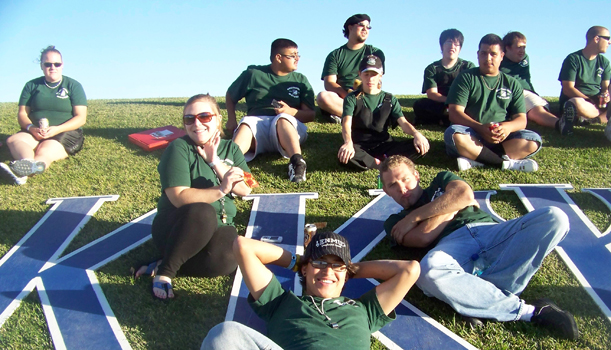Colleges and fraternities go hand in hand and often do for marching band members as well. Mixing music, philanthropy and social functions, the four major music fraternities—Kappa Kappa Psi, Tau Beta Sigma, Phi Mu Alpha and Sigma Alpha Iota—give university students an even greater connection to music, their school and each other.
Photo courtesy of the Kappa Kappa Psi national organization
It’s the night before a West Virginia University home football game, and the marching band is rehearsing its patriotic field show—complete with a gigantic American flag to open up across the field. Suddenly, Old Glory suffers a huge rip! Mass confusion and chaos ensue amongst the band members. What are they going to do tomorrow? They certainly can’t bring out a giant ripped flag!
Around the field, Adam Cantley and other members of the Kappa Kappa Psi fraternity make eye contact with each other. They knew what they had to do. They put aside any Friday night plans and channeled their inner Betsy Ross.
“We stayed on the field hand-sewing the American flag for hours,” says Cantley, who, years later, now serves as the organization’s national president. “People in the stands had no idea we had sat there and sewn that fl ag the night before. We didn’t need any accolades, but we still laugh and talk about how we sat there with thread and needle. Sometimes it’s about doing things that are ridiculous but make a big difference.”
And it’s that kind of “ridiculous” dedication to their collegiate band programs or to music in general that characterizes the members of music fraternities and sororities.
When applying to, choosing or attending colleges, students may want to consider the availability of music fraternities and sororities as a way to supplement their social experience and their participation in band or other music ensembles. These organizations focus on a love of music or dedication to the band while incorporating some of the social aspects associated with traditional (Panhellenic) fraternities and sororities.
Kappa Kappa Psi (KKPsi) National Honorary Band Fraternity and Tau Beta Sigma (TBS) National Honorary Band Sorority are exclusive to band members, and their primary purpose is to provide service to the band. Both are co-ed although at schools that have both available, the membership can skew gender exclusive. The two groups are run together at the national level.
Phi Mu Alpha Sinfonia is the world’s largest and oldest music fraternity, open to any males that simply have an appreciation for music and wish to work for music’s advancement in America. Although called an International Music Fraternity, Sigma Alpha Iota (SAI) inducts female musicians who have taken at least one music class at their college or university.
Helping the Music Program
So what do these groups actually do? KKPsi and TBS are, first and foremost, responsible for assisting with the needs of the band.
“We couldn’t function without them, in all honesty,” says Dr. Debra Trafi cante, assistant director of bands at the University of Oklahoma and national vice president for professional relations of TBS. “Between KKPsi and TBS, we have about 100 students that provide service—that’s one-third of the band. A tremendous chunk of responsibility for public events goes to them. I just can’t even imagine us doing any events without the group.”
Their responsibilities include passing out plumes, water and box lunches at home games; distributing room keys, loading and unloading uniforms and luggage for away games; and ushering or hosting post-concert receptions for the indoor groups. While these tasks may seem unglamorous, these student leaders enjoy helping the band above all else.
“I just love helping people; any service that we get to do, I love it,” says Ashley Singleton, president of TBS at the University of Oklahoma. “I joined because I got to know a lot of the people that were in it and saw the kind of people that they were: self-motivated, humble, loved helping people and doing things for others—and that’s what I’m all about.”
The activities vary from school to school. “They get there early to set up, stay late to tear down, raise money to commission musical pieces, put together reading bands, outreach to visiting bands,” Cantley says. “We do anything that the college band directors need.”
Phi Mu Alpha, while not directly affiliated with collegiate bands, still works with the band as well as other on-campus musical organizations such as orchestras and choral groups. “We’re involved with band, choir, show choir, we’re a lot less focused on the band and are more broad,” says Ryan Case, a recent alum at Mississippi State University (MSU). “We’re not so focused that it drives us in one direction or another. We see a problem and step in to try and help.”
In his years as an MSU Sinfonian, the fraternity cleaned and repainted the music department building, performed each year at band camp, provided ushers for concerts, and serenaded Sigma Alpha Iota and other sororities.
“It varies from chapter to chapter; many have a men’s choir that all members can join even without a choral background, and most have smaller choral or instrumental ensembles too,” says Mark Wilson, director of communications for the national organization. “Once a year each chapter puts on an American Music Recital, and they perform entirely American music. You’re going to get a lot of different social activities that vary wildly [within] this common ground of being interested in the promoting of music.”
Serving the Community
Chapters of Sigma Alpha Iota also serve their school’s music programs by ushering, hosting, performing or other tasks but primarily focus on their broader community service projects. Some of these include the People-to-People Project, which provides instruments or other music materials to those in need both domestically and internationally, or their special needs programs to translate music into Braille or provide large-print copies.
“We’ve been around over 100 years, and we keep growing— it’s our mission to encourage, nurture and support the art of music,” says Christine Bruns, national vice president of collegiate chapters. “A lot of groups have different focuses, but we are focused on our love of music and the arts.”
KKPsi and TBS chapters also participate in different community service projects outside of the university. For example, Oklahoma’s TBS chapter has participated in community concerts, a Veteran’s Day parade, planned a canned food drive for local needy families and volunteered with the Girl Scouts and Special Olympics.
Phi Mu Alpha’s official philanthropy is the Mills Music Mission, started by the fraternity’s founder Ossian Mills. The brothers visit hospitals and nursing homes to perform for patients as well as perform and volunteer at children’s homes. Case specifically remembers performing for one elderly man who turned out to be a Sinfonian from the 1940’s. Although the man died a few days later, his family contacted the students to thank them for lifting their father’s spirits in his final days.
“You get to see the tangible benefit of doing something for someone else out of the goodness of your heart, in our case it’s bringing the gift of music,” Wilson says. “Talking to the person, singing or playing for them can really help them personally and spiritually.”
Being a Leader
For members that wish to get more involved beyond their own school and community, there are numerous leadership opportunities at regional, state and national levels as well. “I watched people that were very unsure of themselves come out of their shell and become really excellent leaders through Sinfonia,” Case says.
Many students become regional or state representatives and then go on to volunteer positions at the national level. Larger national conventions are planned and attended by students across the country. “I had the opportunity to help organize and plan a convention with more than 700 participants and alumni,” Cantley says. “Everybody gets a degree, but not everyone gets to plan a convention or raise money to commission a piece of music. Those out-of-classroom experiences make you a wellrounded person and more valuable when you leave college.”
And alumni connections can come in handy, both in and out of the music industry. “Once they graduate, we have a large number of alumni chapters and opportunities for continued service and connections,” Bruns says. “When I was moving because my husband joined the military, I was able to network with alumni and find a job.”
Even Case, who is a civil engineer, was able to use his alumni connections to start his career. “We’re a nationwide fraternity, and I have been in some of the most odd locations and crazy places, and Sinfonians have approached me,” Case says. “During my interview process for my first job, the guy was a Sinfonian.”
Socializing
It’s not all hard work and philanthropy for these organizations. All four have plenty of fun, social activities as well. “If you’re new to a university, joining any band immediately allows you to be part of a bigger family, but when you join a sorority or fraternity within your band culture, it makes the bond between those people even closer,” Traficante says. “We all play an instrument and all love music, but when you take a step further to give back to the organization, the students really become lifelong friends. They work hard and play hard together, and it becomes a lifelong endeavor for them.”
Case even called on his fraternity brothers to help him propose to his wife. They serenaded her as he proposed and performed the same song at his wedding, where six of his eight groomsmen were Sinfonians.
“Lifelong friends is a striking concept—as I continue to be a part of Sinfonia, it continues to give me a sense of belonging, and it makes me feel proud of something I can continue to be a part of and strive to work for,” Case says. “It’s not just a four-year thing; it’s a lifelong journey. Knowing that my fraternity goes on through me and around me is very heartening.”
About the Author
Elizabeth Geli is the assistant editor and web editor for Halftime Magazine and a freelance journalist and communications professional in Los Angeles. She marched flute at Valencia High School in Placentia, Calif., and in the University of Southern California (USC) Trojan Marching Band, where she now works as a teaching assistant. She has a bachelor’s degree in print journalism and a Master’s in Specialized Journalism (The Arts) from USC.


